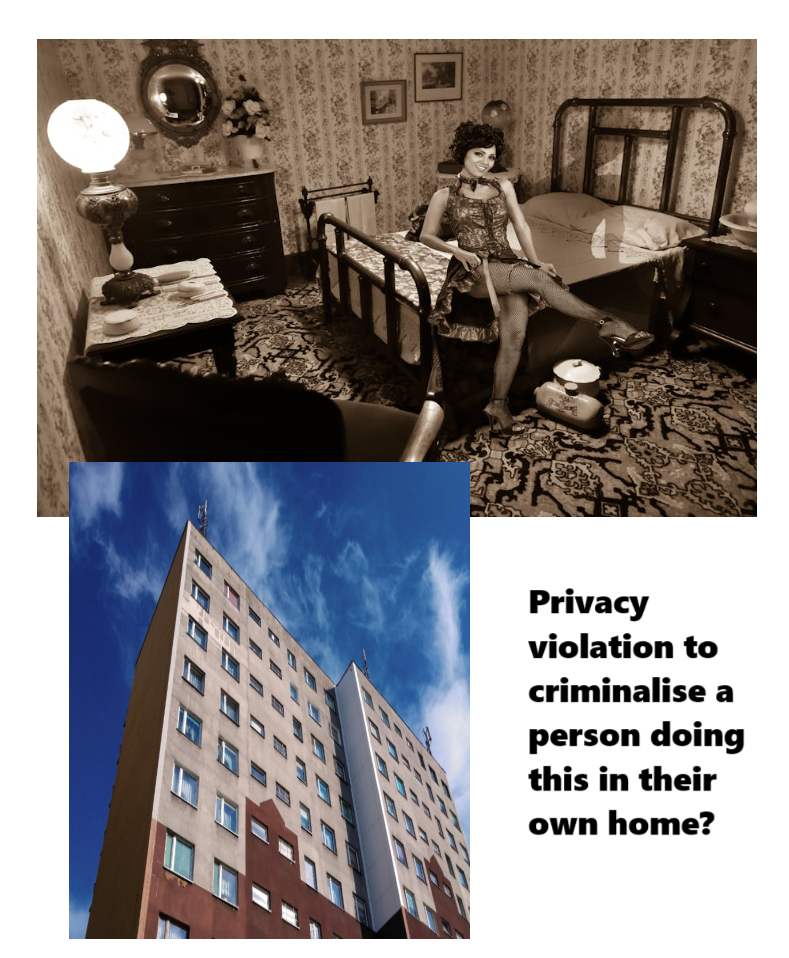AFFAIRE M.A. ET AUTRES c. FRANCE, Case no 63664/19, 25th of July 2024
Citation: FFAIRE M.A. ET AUTRES c. FRANCE, Case no 63664/19, 25th of July 2024
Rule of thumb : Is legislation making prostitution a crime, even by someone from the privacy of their own home/bedroom, a violation of the Article 8 Right to Privacy? No, this legislation is not a violation of Article 8, especially if there is a Government process involved in relation to this.
Facts: The basic of this case were that France introduced legislation making prostitution prima facie a crime - including doing so from the privacy of their own home (not just street prostitution). This legislation meant that before prostitutes could do this they had to register with the state & affirm they were not being trafficked, and this also encouraged them to become skilled in other trades so that they could leave the trade if they wanted, before only then could they do prostitution. Affaire argued that this system was a violation of Article 8 – she argued that the Government could not outlaw this taking place in the privacy of the bedroom between 2 consenting adults.
Judgment:
The Court deemed that this was not a violation of Article 8. Prostitutes could do more for society by doing other trades & it was not a violation of Article 8 to seek to direct them towards these before they engaged in this trade. This also served a legitimate purpose of helping to stop human trafficking gangs. This legislation is Article 8 compliant.

‘Measures to improve the care of persons in prostitution
19. The same law created a pathway out of prostitution and social and professional integration to be offered to all persons who are victims of prostitution, procuring and trafficking in human beings for the purpose of sexual exploitation. It must be defined according to the assessment of the health, professional and social needs of the person concerned, and be drawn up and implemented, in agreement with the person being supported, by a specialised association. This aid is financed by a fund supplemented by the State and by the proceeds of confiscations pronounced for the punishment of certain offences, in particular trafficking in human beings and procuring.
20. It also includes persons engaged in a process of leaving prostitution or who have been victims of trafficking in human beings or procuring among the persons who should be given priority.
164. Finally, the Court notes that the abolitionist approach adopted by France is intended to gradually eradicate prostitution by offering alternatives to prostitutes (see paragraphs 19-21 above), without, however, prohibiting that practice. As indicated by the Government, prostitution is not prohibited in France and it remains lawful and tolerated. In those circumstances, the Court is not convinced by the applicants' argument that maintaining the status of "self-employed workers" for persons who continue to engage in prostitution, on which it has already had occasion to rule (V.T. v. France, cited above), would call into question the coherence of the overall mechanism put in place by Law no. 2016-444 of 13 April 2016.
165. The Court does not lose sight of the applicants' arguments relating to the inadequacy of the resources allocated to the various administrations responsible for implementing the measures provided for by Law No 2016-444 of 13 April’.
Judges: Lado Chanturia, president; Mārtiņš Mits; Stéphanie Mourou-Vikström; María Elósegui; Kateřina Šimáčková; Stéphane Pisani; Catherine Brouard-Gallet.
Warning: This is not professional legal advice. This is not professional legal education advice. Please obtain professional guidance before embarking on any legal course of action. This is just an interpretation of a Judgment by persons of legal insight & varying levels of legal specialism, experience & expertise. Please read the Judgment yourself and form your own interpretation of it with professional assistance.

